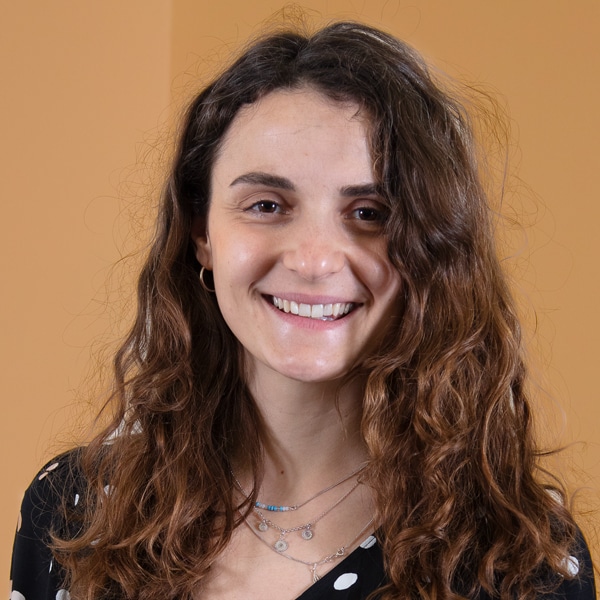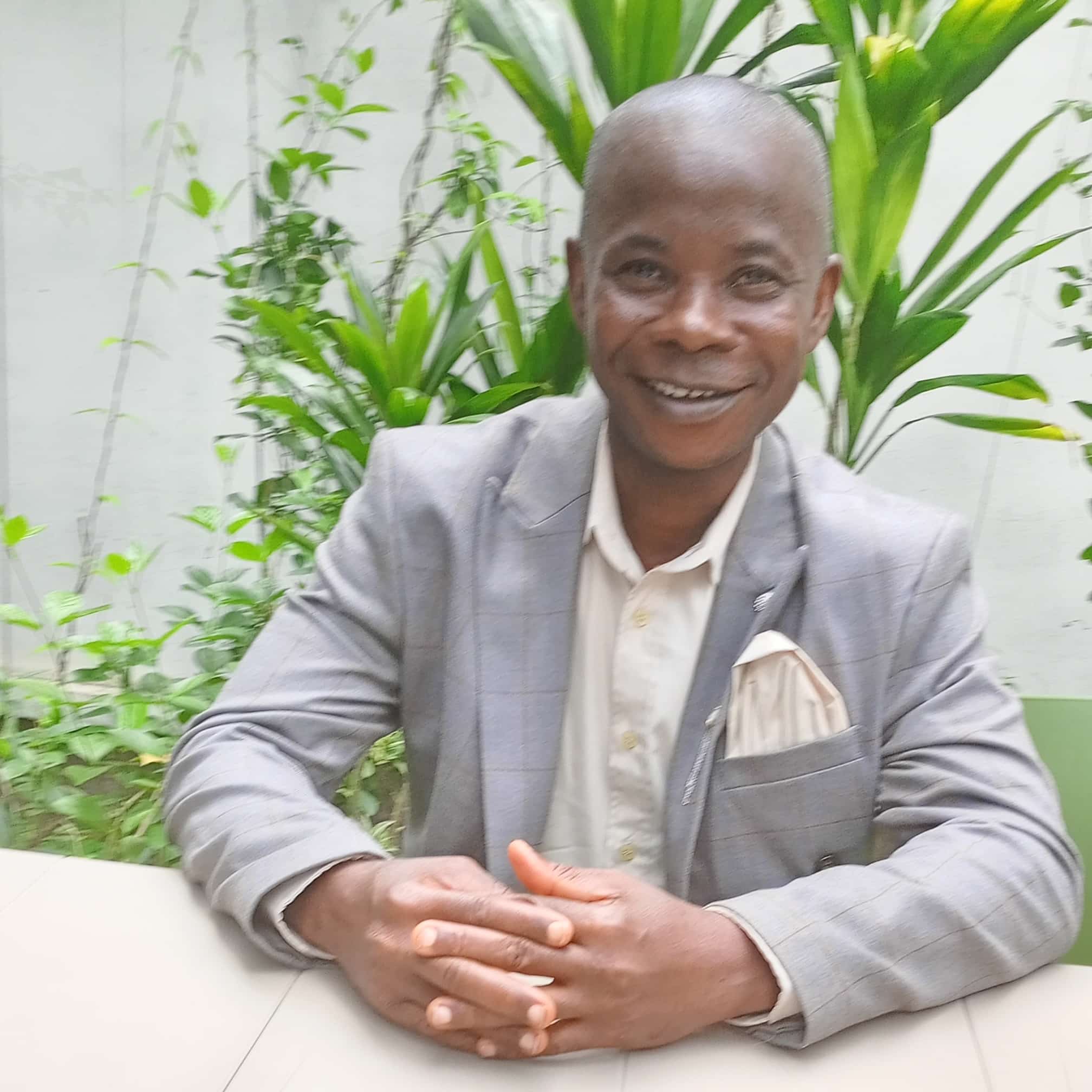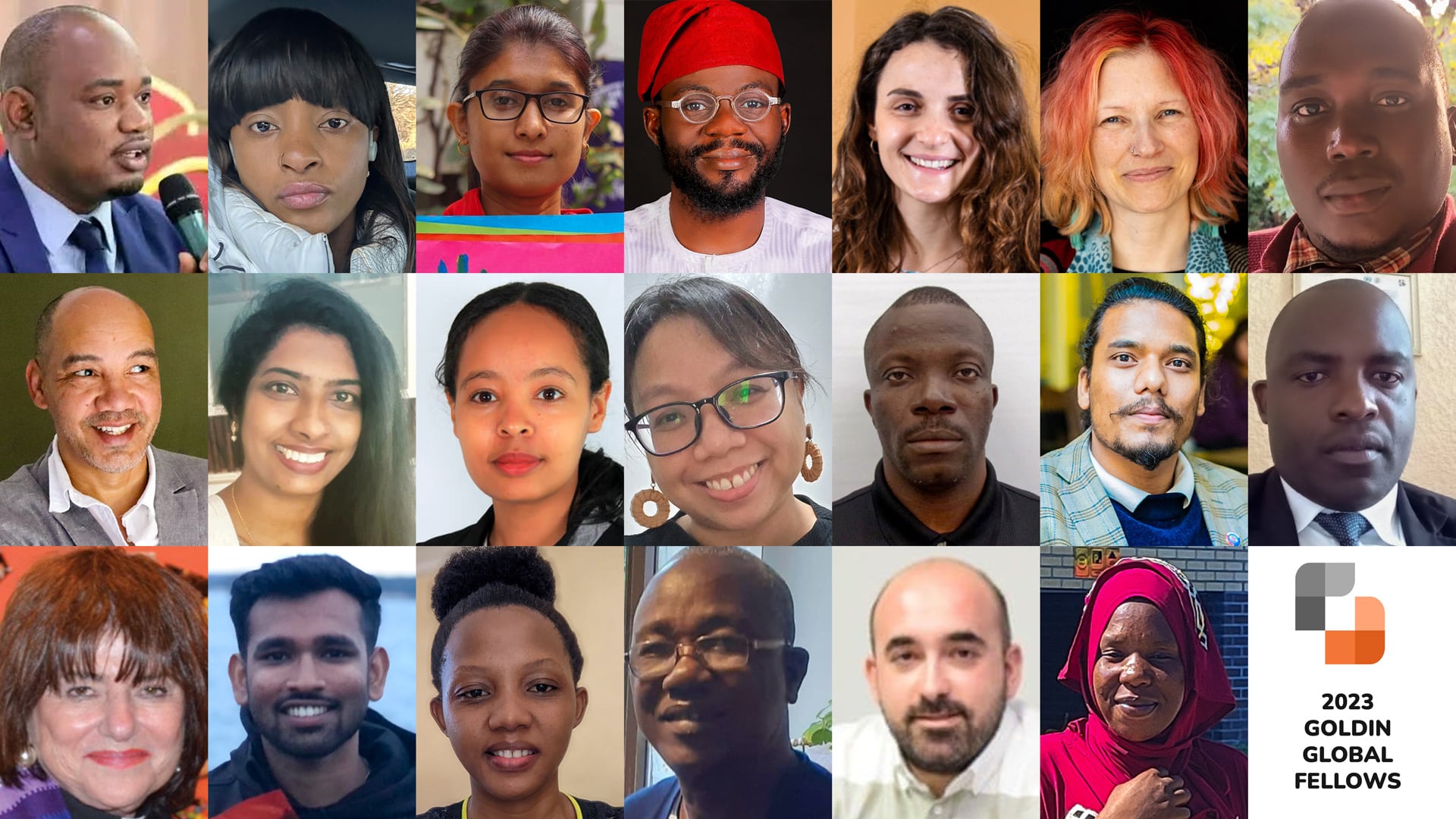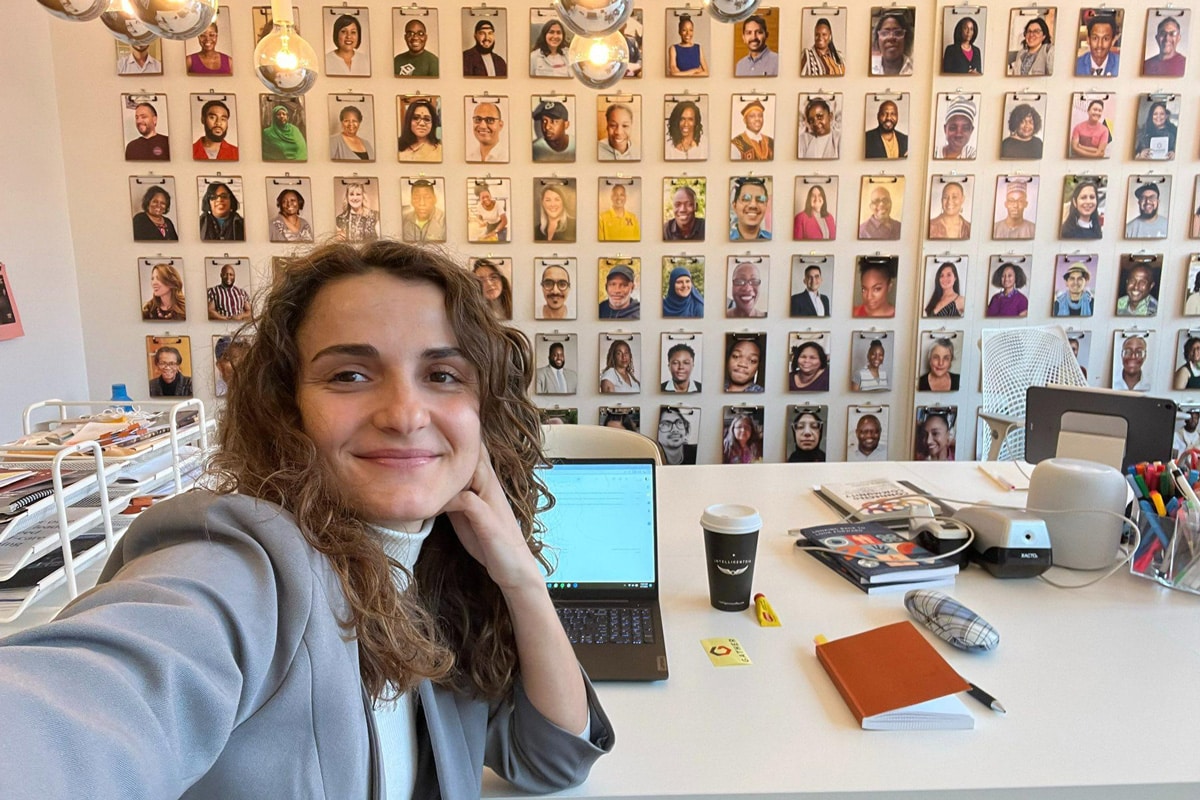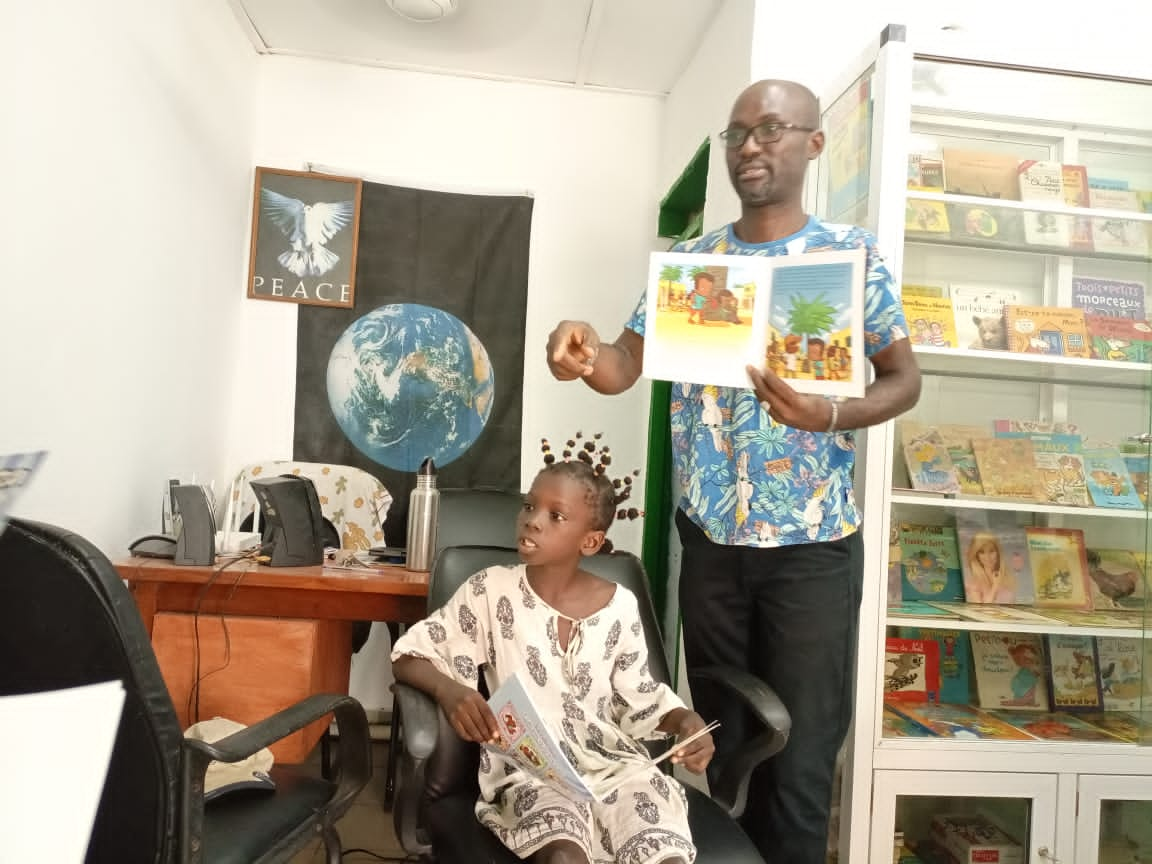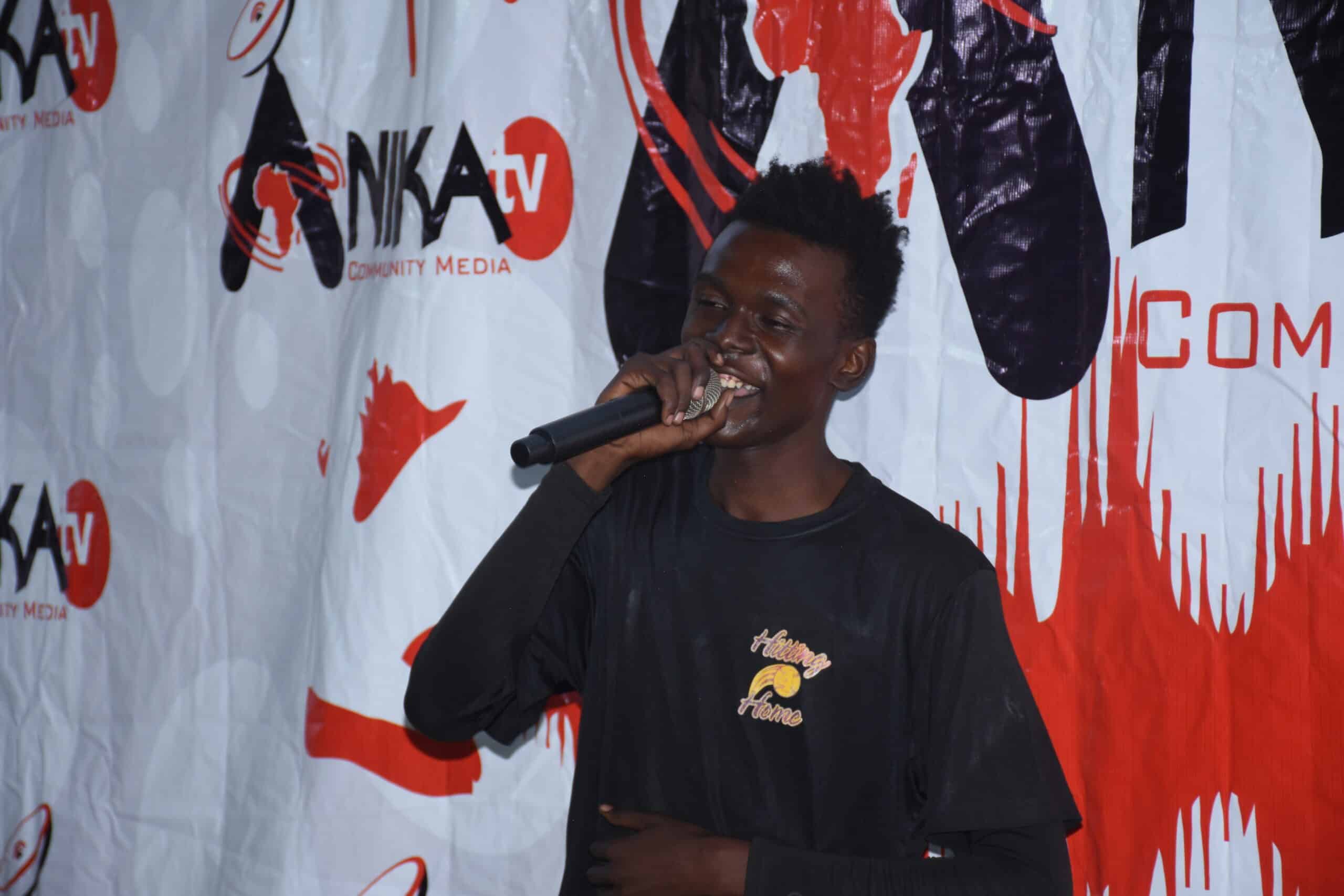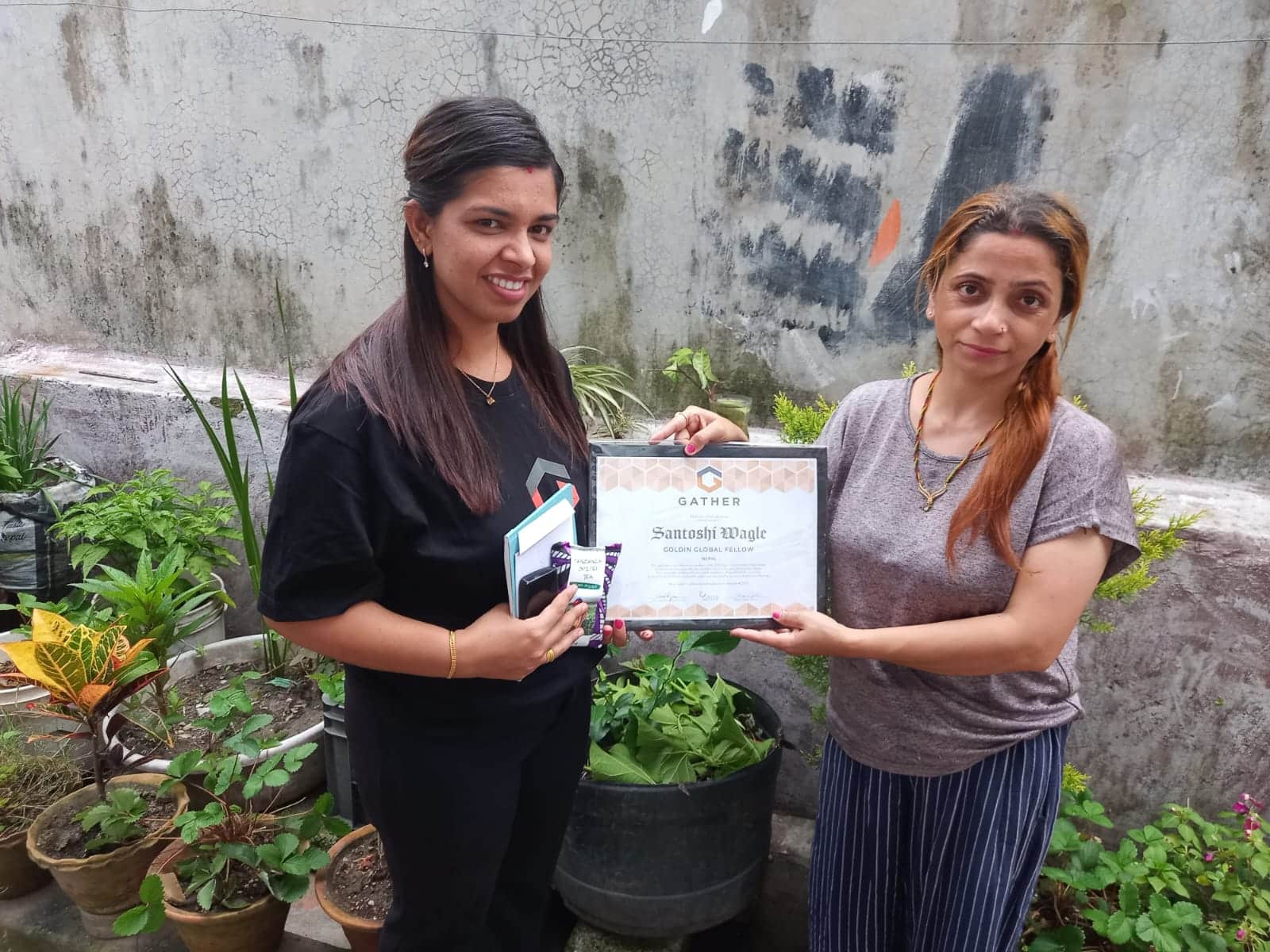Transcending Borders: Two Fellows Helping U.S. Trafficking Survivors Become Financially Literate
Two community activists, Jill Langhus-Griffin, the Founder of Liluye from Arizona, and Tarun Masapeta, the Founder of Project Educate India Financially (EIFL), from India, first met virtually in June, during the first weekly roundtable of the 2023 Goldin Global Fellowship. With other peers from around the world, during the Fellowship, they discussed their own communities' most emergent needs and ways they can play an active role in establishing and maintaining community-driven social changes. These discussions and utilizing the GATHER platform brought them closer to their shared goals for a better society.
After a joint meeting in August, Jill and Tarun met in person in Phoenix, Arizona, to dig deeper into a possible partnership between their two organizations to create a financial literacy program for trafficking survivors in the U.S. With a plan to tailor it to other areas of the world who could benefit from this training afterward, Jill and Tarun have forged a collaboration to empower trafficking survivors in the U.S.
Through this collaboration Project EIFL X Liluye was born to address the unique financial challenges faced by trafficking survivors in the U.S. The project spans an 8–10-week timeframe for approximately 8-10 participants. It features up to eight financial topics taught in 45-minute, separate Zoom workshops. Their endeavors in this joint initiative reflect the power of community-driven initiatives in tackling such issues.
Joining Forces to Help Trafficking Survivors Become Financially Literate
At the beginning of our conversation, they shared why the creation of this program was essential. From her experience and activism, Jill knew that survivors, especially those she knew in the U.S., have challenges around re-establishing their credit and becoming financially independent. “When Tarun and I first met and chatted online in July, and I found out that he had been offering other organizations education in financial literacy and other things, I realized there was an opportunity for collaboration.” Jill says. "To continue the mission of my project, it felt like a good intersection to integrate our ideas and bring the EIFL curriculum to trafficking survivors in the U.S. Jill gave me a little insight into how a lot of trafficking survivors usually end up losing most of their assets if they have any and their belief in themselves." Tarun says. Jill elaborates that traffickers often taint survivors' credit, thus making it hard for them to become economically empowered. “Providing a basic course on personal financing would be a good start to help these survivors get back on their own feet.” Tarun adds.
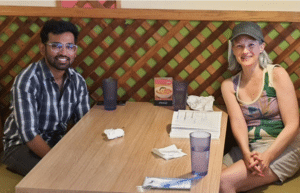
Goldin Global Fellowship as the Meeting Place
Jill and Tarun shed light on how their participation in the Global Goldin Fellowship played a role in the development of this program, considering one of them is from the U.S. and the other from India.
"If I had not been part of the Goldin Fellowship and had not been reaching out and interviewing other Gather fellows in our cohort, such as Tarun, I would not have known that there was an opportunity for collaboration on this financial literacy program."
- Jill Langhus-Griffin
She adds: “When Tarun and I were talking about Liluye and what my vision, plan, and goals were for it, and Tarun was talking about his organization, Project EIFL, it occurred to both of us almost simultaneously that there was an opportunity to collaborate and make more impact together.” Tarun also acknowledges they would not have joined hands in this collaboration if it had not been for the Goldin Global Fellowship: "Jill and I connected right before I left for the U.S. on a Zoom call where we discussed our work and how we felt there was a lot of scope to collaborate. We also met in person in Phoenix, Arizona, to discuss our expectations and set the ball rolling by laying out a blueprint." Even before this Zoom meeting, Jill was impressed by Tarun’s ambition, likable personality, and enthusiasm for impacting and helping others. “So, when we met on Zoom, it was not strange to me to ask him if he would be interested in collaborating on a financial literacy project/program together.” Jill says.
What does the project cover? What's its impact?
The Project EIFL X Liluye program will cover these areas that survivor colleagues and team members identified as being essential topics:
- How to open a bank account (step by step)
- How to calculate taxes (where to set them aside, where to put them, how to reinvest them, how to do balance sheets, and what is taxable)
- How to invest
- How to reinvest in their business (how to start anew as an individual and/or business)
- Organizational financial literacy (when given a lump sum and financing their own organization)
- How do they pay themself (not out of a business account)
- Where to put their money (what to budget in, what to spend on, and what percentage to take out)
- Financial Aid (for anyone considering going back to school).
Conclusively, they share what impact they strive to achieve through this project, both for the survivors and the broader community. Tarun says the project aims to teach financial literacy basics, allowing individuals to make learned decisions.
"Our goal collectively is to ensure that all attendees have a good understanding of topics we would discuss and that they are being in practice."
- Tarun Masapeta
He highlights that this marks EIFL's first project in the U.S., making it the 5th country outside India to facilitate financial literacy workshops. Jill, who is always looking for the best, most impactful ways to serve and help survivors, shares her thoughts on what this project means for the survivors. “It occurred to me that all survivors I know share a common concern about lack of funding. With this training, they potentially would not need to struggle anymore in this area, and they could become more empowered by having control over their finances and, in turn, their lives.”She hopes that all the survivors that attend the program will gain clarity in all the topics covered, that they will feel confident and empowered to take control of their finances or more so than they were before the program, and to build the organizations that they are planning to or feel more confident in controlling their organization’s finances after taking it.
Jill and Tarun are among 20 community activists who participated in the 2023 Goldin Global Fellowship, living and working in Albania, Bangladesh, Burundi, Cameroon, Ethiopia, India, Kosovo, Malawi, Mali, Nepal, Nigeria, the Philippines, Senegal, South Africa, Sri Lanka, Tanzania, the United States and Zimbabwe.For five months, this diverse group of fellows worked together as a Community of Practice, building on their neighbors' talents and their communities' assets to make real and lasting change around the world.
Twenty More Reasons for Hope! Celebrating the graduation of the 2023 Global Fellows
What’s your reason for hope?
As a grassroot leader with a commitment to learn and partner with my neighbors to transform our lives, this question becomes more critical in challenging times. Times when my society is beset with climate related disasters in Northern Tanzania — taking over 63 lives and destroying homes. Times when education, public health, and infrastructure fail to meet the aspirations of people. And, when global efforts, such as COP 28, struggle in translating agreements into action.
In the face of such disappointing realities, finding solid reasons for hope becomes a survival mission for me. I believe the meaningful actions I take today have the potential to inspire others to act together for shared progress. I am lucky to be working with the Goldin Institute, whose mission of building grassroots partnerships for global change, allows me to participate in cultivating more reasons for hope.
Between June and November this year I participated in creating a space for 20 grassroot leaders from 19 countries to learn and work together on addressing tough issues experienced in their communities. They gathered from Albania, Bangladesh, Burundi, Cameroon, Ethiopia, Haiti, India, Kosovo, Malawi, Mali, Nepal, Nigeria, Philippines, Senegal, South Africa, Sri Lanka, Tanzania, United States of America, and Zimbabwe.

“I realized that we have a oneness in our aspirations. One common dream to make our communities better. We are united in that. Learning from everyone’s work in their communities was very impactful.” — 2023 Goldin Global Fellow from Nigeria, Godson Nwanko
Building on Talents & Assets
For 22 weeks we explored the GATHER curriculum, which is designed for people who want to build on the talents of their neighbors and the assets of their communities to make real and lasting change. We reflected on a set of big ideas for promoting community driven social change. We tested each idea locally with our learning partners and reflected on the outcome of applying each set of ideas at the weekly roundtables. This process gave rise to peer-to-peer learning and further enriched our collective learning experience. Furthermore, this approach opened doors to collaborative possibilities—an outcome which led to some real collaboration taking place.
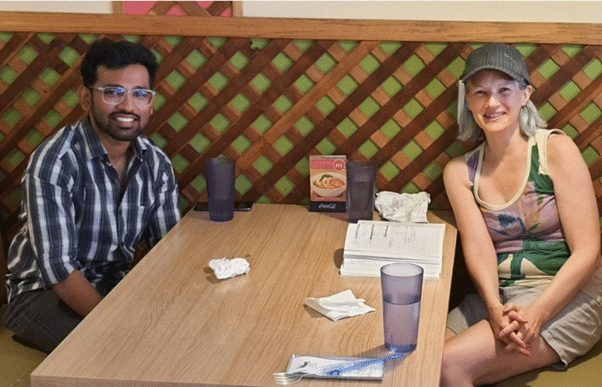
While the learning space was virtual, each learning outcome was complimented by practical applications of the ideas and concepts in the real world to strengthen organizational skills and hone new outreach techniques. Grassroot leaders involved adapted themes like Asset Based Community Development and Community Visioning Summits to find solutions specific to the context of their countries.
In the photos below, grassroot leaders from Bangladesh, Burundi, Nepal and Sri Lanka led an asset mapping exercise to identify gifts, talents, and resources found in their communities. They engaged respective community members in the process and together reflected on the connections and emergent possibilities existing assets can reveal in meeting shared aspirations.
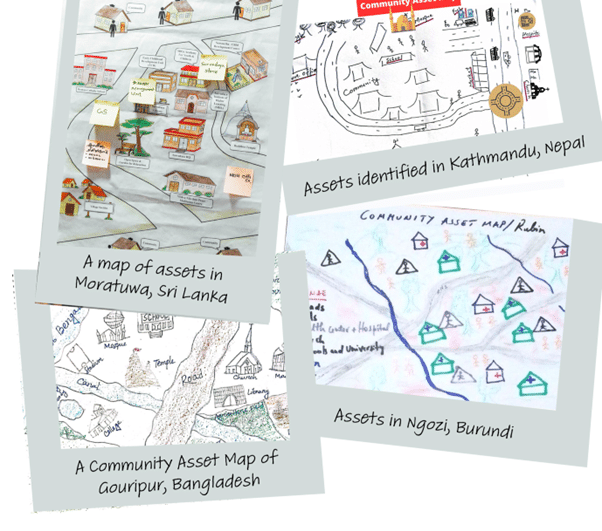
“I have already started applying what I learned during the Gather program. In my hometown, we now use the Asset Based Community development method to approach our social issues”—2023 Goldin Global Fellow from Albania, Nensi Dragoti
From the asset maps developed, the grassroot leaders hosted visioning summits inviting members of the public, especially those living closest to the issues and often missing from official community meetings. Together, they expanded the scope of their asset maps with the help of new ideas from community members. They applied the Appreciative Inquiry technique to come up with new visions for their communities. Visions that inspire neighbors to voluntarily work together to bring the change they want to see.
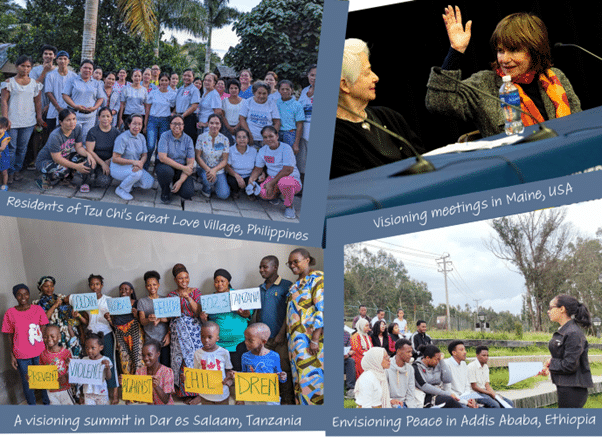
A Community of Practice
On the 22nd of November 2023, these 20 grassroot leaders from 19 countries finally graduated from this year’s cohort—making it a fifth cohort since 2018. They are now joining a community of practice of the Goldin Global Alumni Network composed of 212 grassroot leaders from 53 countries. The mission of the Goldin Global Alumni Network is simple: promoting shared learning through expanding the Gather curriculum and deepening relationships to create collaborative opportunities.
I invite you to learn more about my 20 reasons for hope by reading each of the 20 grassroot leaders I had the privilege to learn and work alongside this year on this article, meet the 2023 Goldin Global Fellows. While it is easy to lose hope in the face of ongoing conflicts in Ukraine, Gaza, etc. I invite you to look at what talents, gifts, and connections you have in your local community. See if you can invite your neighbors to explore the connections between these assets and the possibilities that could emerge if you collectively tapped on those assets to address issues that matter the most in your community. You also have the power to be the source of hope!
“I hope to become a more unbiased, effective and efficient leader and role model for others, making more impact for a more equitable world.” —2023 Goldin Global Fellow from Arizona, USA, Jill Langhus-Griffin
Get in touch with us to learn more, connect and partner with individual grassroot leaders to support their work. Sign up here to receive periodic news from the Goldin Fellows in 52 countries. You can support our community of practice —Goldin Global Alumni Network—at this donation page. Become the reason for hope, the world needs more hope!
Mobilizing Communities to Combat Organized Crime
John Kamma, a 2021 Global Fellow from Liberia, recently participated in the sustainability discussion and capacity-building sessions of the West Africa Regional Network on Organized Crime (WARNOC) in Cote D’Ivoire, West Africa.
John, a fantastic community activist and the Founding Executive Director of the Citizens Bureau for Development and Productivity in Liberia shares his insights from this journey and how confronting issues such as organized crime and human trafficking requires a community-based response.
Drawing upon experiences, observations, and productive initiatives witnessed during his trip to the region, he emphasizes the importance of empowering local communities to combat organized crime. Further, John recalls his experience as a Goldin Fellow and what lessons he still carries with him. He acknowledges that the fight against organized crime, especially in low-income communities in West Africa, calls for a multifaceted approach that empowers communities, engages civil society actors, leverages partnerships with relevant institutions, and secures vital resources for people in need.
In this article, he speaks on the critical role of listening communities closer to the issue and igniting social change from the bottom.
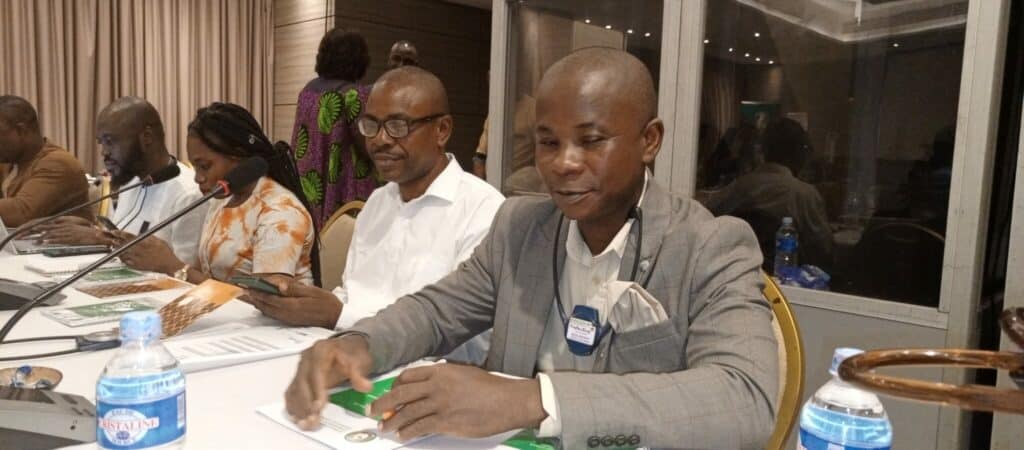
Community-based Response in Tackling Violence, Human Trafficking, and Organized Crime
Initially, he provides more details about the specific challenges West African communities face with organized crime and violence. “Some of the more emergent challenges are artisanal gun and weaponry, arms trafficking, human trafficking, fraudulent medicines, artisanal trafficking, money laundering, force recruitment, extension to illicit use of drugs and prostitution in mining sites, toxic waste dumping.” Others include election-related violence, youth inclusion, and land management.
To adequately address those vast challenges, he believes in the importance of community-based response. . For instance, he shares that a community in Liberia mobilized its people, took action, and broke down a dilapidated structure, which was seen as a criminal hideout and all kinds of illicit activities, including the sale of illegal drugs.
In another example, communities embraced the establishment of Community Justice Teams whereby local community dwellers were trained in skills needed for better community participation- and a better understanding of the importance of a harmonious society. “They were trained in alternative dispute resolution and mediation skills to resolve disputes before they could reach the point of violence or need to be taken to the Police station or the Court”, John shares. These mediators are also creating awareness against transnational organized crime to prevent victimization.
[Read HERE more about the Community Justice Team in Liberia]
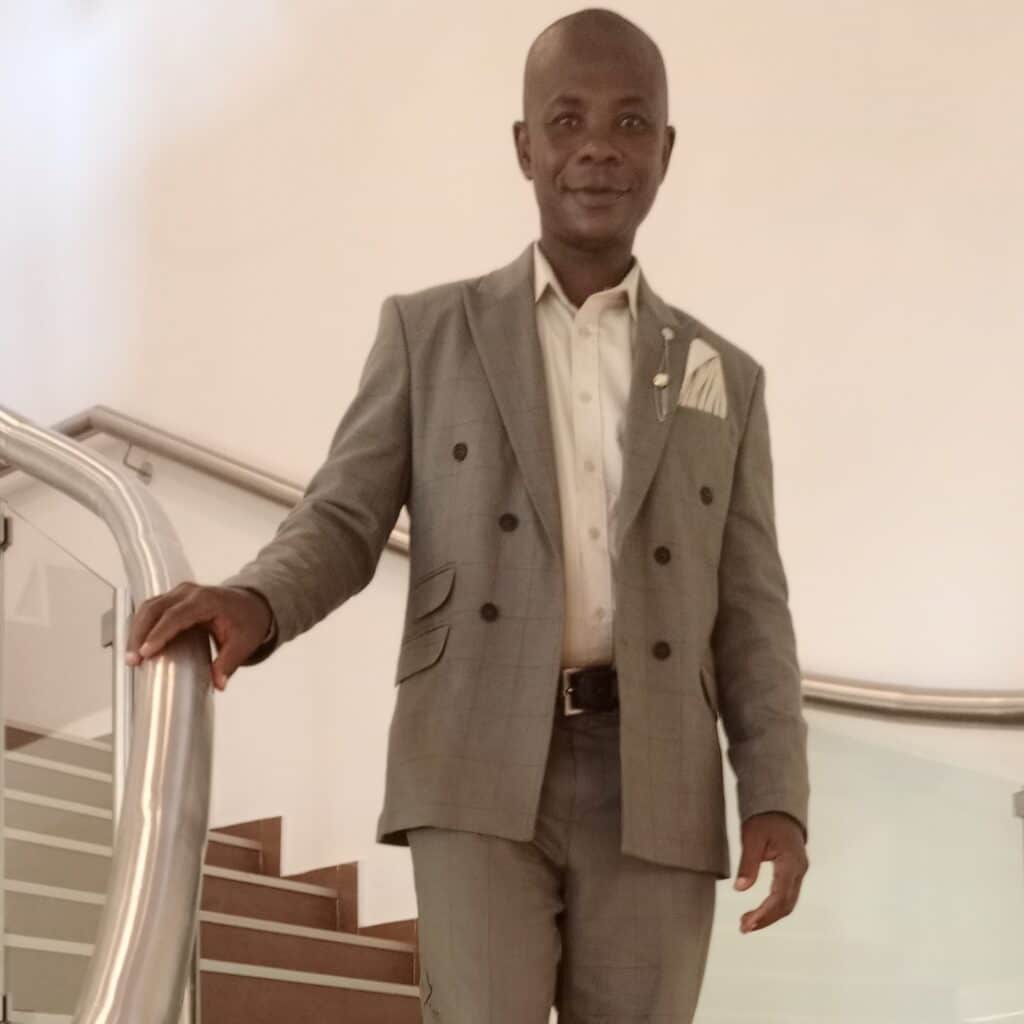
Learning from Opportunities and Long-Term Lessons
John says that WARNOC members faced an important question: how they can sustain the network and what functions and competencies exist collectively that can be harnessed toward continuing the work of the network. “This became critical as the organizations had not previously profiled and assessed how they could use their various functions and fields of expertise to support the effective functioning of the network.” The members were supported to identify the functional areas and strengths and how to use these to contribute to the expansion of the network.
Furthermore, the members highlighted the need for the network to begin engaging with the Economic Community of West African States (ECOWAS) Commission towards forming a partnership agreement. “Such agreements allow us to provide the ECOWAS Commission with credible research results, engage in advocacy at the regional and national level, as well as monitoring and reporting on progress or otherwise, all made to prevent transnational organized crime from negatively impacting communities in the region.” This topic and John’s remarks take greater importance while we acknowledge their importance transcends time.
Envisioning the long-term sustainability of the efforts discussed during the sessions, John shares: “The long-term sustainability was outlined as resource mobilization and institutional capacity building to support advocacy and research activities identified during the workshop.” He believes that establishing a network governance structure, strategic development and action plans, network registration, coordination matrix, funding raising, and communication strategy would benefit the community in tackling this hardship.
Again, speaking from his experience during this trip, he says that youth employment, education against violence, organized crime, and increasing donor support are among the most pressing needs and priorities for addressing organized crime in this region.
He includes the significant role of civil society involved in this process. “We also must work toward increasing civil society involvement to step up sensitization and advocacy for policy formulation and implementation at the national level. Civil society and government partnerships leverage resources for active civil society involvement against organized crime.”
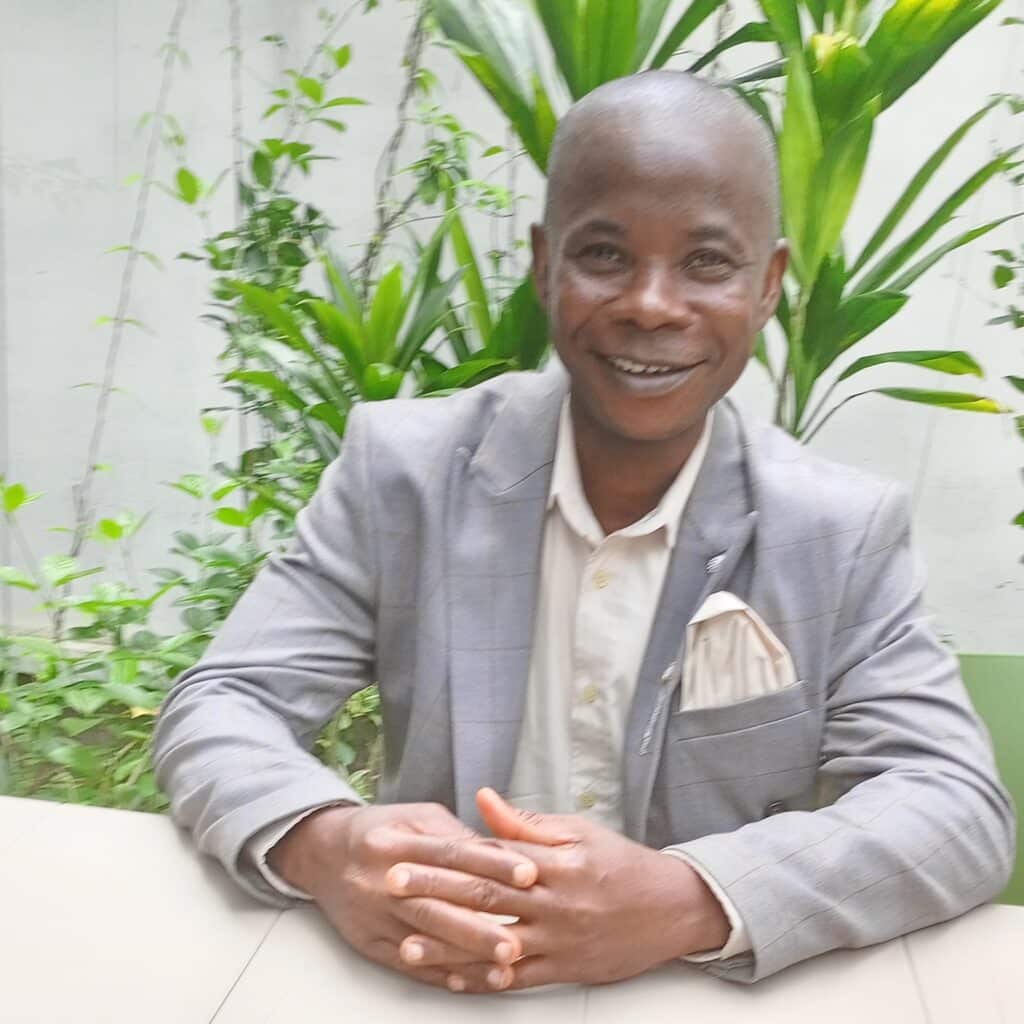
Goldin Lessons: In Community, Everyone Deserves to be Heard
Being a Goldin Fellow has taught him the importance of tailoring any interventions to the needs of the people by planning together with them. “This way, people get involved and take ownership, which is key to sustainability. The lessons I still carry with me today gained from the Goldin Institute are: In community organizing, everyone matters and has the right to be heard in deciding a community’s future despite background or station in life.”
Note: The Functional Focal Areas/Contributions to WARNOC across all member organizations include Research, Advocacy, Communication, Community Sensitization, Mobilization, and Training. Others are Data Collection, Grants and Proposal Writing, and Development of Policy Briefs or Papers.
Three Diverse Voices United during their Goldin Global Fellowship Journey
Coming from different countries and diverse backgrounds, three individuals joined on a remarkable journey through the 2023 Goldin Global Fellowship.
In this piece, Jill Langhus-Griffin from Arizona, U.S., Hajra Hussein from Mchinji, Malawi, and Kurt Isaacs from Johannesburg, South Africa, share their experience with the fellowship and the utilization of the GATHER platform.
They found that despite differences, going together along this path instilled in them a sense of unity and ignited a willingness to work towards the positive changes needed in their respective communities.
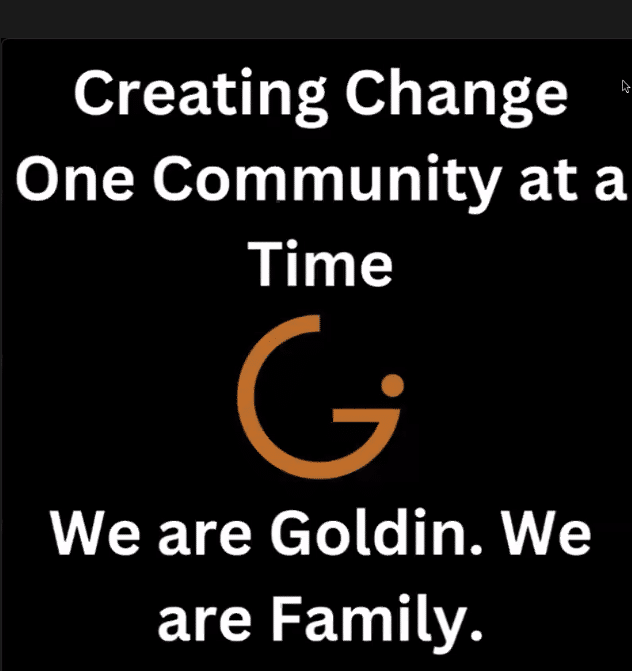
Jill’s Perspective
For Jill, this experience surpassed her expectations in every way.
“This fellowship has been a wonderful experience so far, even better than I had anticipated. I love connecting with like-minded, peace-focused humanitarians who are on the same page as me, are forward-thinking, solution-oriented, and optimistic about the future.” she says.
The course content resonates with her existing beliefs while pushing her to new heights.
“The content in the course is helping me to grow and learn even more personally and professionally. I also really appreciate the program’s collaborative tone and overarching goal.” concludes Jill, the founder of Liluye, a global collaborative community focusing on prevention, economic empowerment, and healing of trafficking survivors.
Kurt’s Perspective
Kurt, a certified Life coach with over 20 years of therapeutic experience in the counseling and education-management space, was immersed in a welcoming sea of knowledge and motivation within the GATHER Program.
“Goldin Global Fellowship and the GATHER platform are really welcoming and inclusive. The program is well thought through and structured. It is littered with titbits of knowledge and motivational material that challenge and shape my thinking.”
Kurt adds that in this environment, learning happens organically.
“I have found the one-on-one conversations most inspiring. As the weeks progressed, the exchanges began moving towards collaboration. This excites me, ” says Kurt, cheering on the possibilities and visions this program brings.
Hajra’s Perspective
For Hajra, GATHER is synonymous with effective communication, cooperation, and diversity.
“GATHER is helping me to communicate, collaborate, and feel more connected in a persistent space that reflects me to create a unique team with different people from different countries.” she says.
She highlights that this also encourages participation to achieve overall satisfaction.
Goldin Global Fellowship Building Global Connections
Jill, Kurt, and Hajra are among the outstanding 2023 Goldin Global Fellows who live and work in Albania, Bangladesh, Burundi, Cameroon, Ethiopia, Haiti, India, Kosovo, Malawi, Mali, Nepal, Nigeria, the Philippines, Senegal, South Africa, Sri Lanka, Tanzania, the United States and Zimbabwe.
We are already witnessing the global marks and ties this diversity of fellows brings to communities, as Jill and the other fellow Tarun Masapeta from Hyderabad in India met in person in Phoenix to discuss the possibility of a partnership between their two organizations (@liluyespirit and @projecteifl) to create a financial literacy program for trafficking survivors in the U.S., with a plan to tailor it to other areas of the world who could benefit from this training.
For this, Jill shares:
“I plan on working together to co-create a financial literacy program for trafficking survivors in the future with one of my fellows, Tarun, who runs EIFL, an organization that focuses on educating and empowering marginalized groups. I am very much looking forward to seeing this program come to fruition and impacting and empowering many women who need this information to grow, thrive, and reintegrate into society.”
As the fellows shared their impressions, it was evident that the power of collaboration and the potential for positive change worldwide is only strengthened by safe spaces, such as GATHER- which remains an inspiring place for others who seek out opportunities and networks for driving change in their community from within.
For this, Yusuph Masanja, Co-Facilitator of the Global Fellows Program, who himself went through this journey, highlights that this cohort represents 20 grassroots leaders from 19 countries.
“Their diverse backgrounds, unique talents and gifts, and commitment to making progress in their communities inspire hope for our shared future. Excited to see where our learning journey takes us together.”
The 21st Anniversary of the Goldin Institute: Celebrating Community-Driven Social Change
My memory of the Kosovo War in the late 1990s is somewhat blurry. Glimpses of paramilitary uniforms, burned houses, gray piles of debris, and crying children remain scattered in the back of my mind. This is where we put our most difficult memories to gather dust. However, the dust fails to erase their existence.
I was barely a kid and could not comprehend the wounds such cruel actions leave in the community. It is a lived history about which I am penning for the first time.
Flash forward to two decades later, I am in Chicago, U.S., studying Media Literacy and Communication as a scholarship holder from the U.S. Department of State through the Community College Initiative (CCI) Program, where an acquaintance told me about the Goldin Institute.
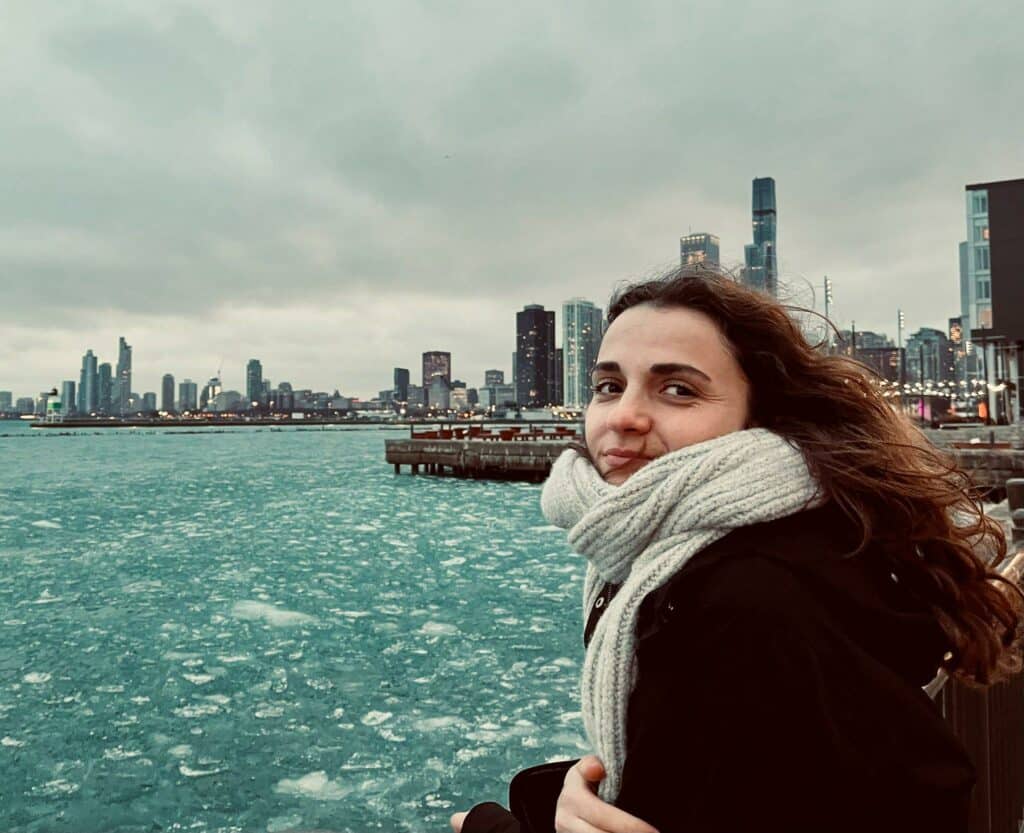
It is undoubtedly not a coincidence that I am touching upon my vague war memories for the first time for a Goldin Institute piece.
I was particularly drawn to the Goldin Institute’s core belief that change should come from the bottom. I applied and was accepted for an internship at Goldin. I was honored and delighted to join the Institute’s efforts in orienting its mission and activities to make this a reality for as many people as possible.
Since its establishment 21 years ago, the Goldin Institute has believed that real and lasting social change requires those within the community who are closest to the issue to have leadership voices and decision-making power; only then can we see the creation of a more just, peaceful, and sustainable world. This is where the Goldin Institute’s mission and my story, beliefs, and ideals cross paths.
People who lived through similar experiences of war and other realities that require social change deserve to tell the story and find a way to rebuild their communities for good. Building stronger communities requires listening to those impacted by social issues, and the Goldin Institute has, for the last 21 years, offered a global platform and a supportive community to facilitate this.
In honor of the Goldin Institute’s 21st anniversary and my almost one-year journey with the organization, in this article, I touch upon three shaping experiences for me.
The Beginning of my Journey
I walked into the Goldin Institute office in Chicago for the first time on a cold Tuesday in February. What first caught my eye was the wall filled with smiling portraits of the Chicago Peace Fellows and the Goldin Global Fellows.
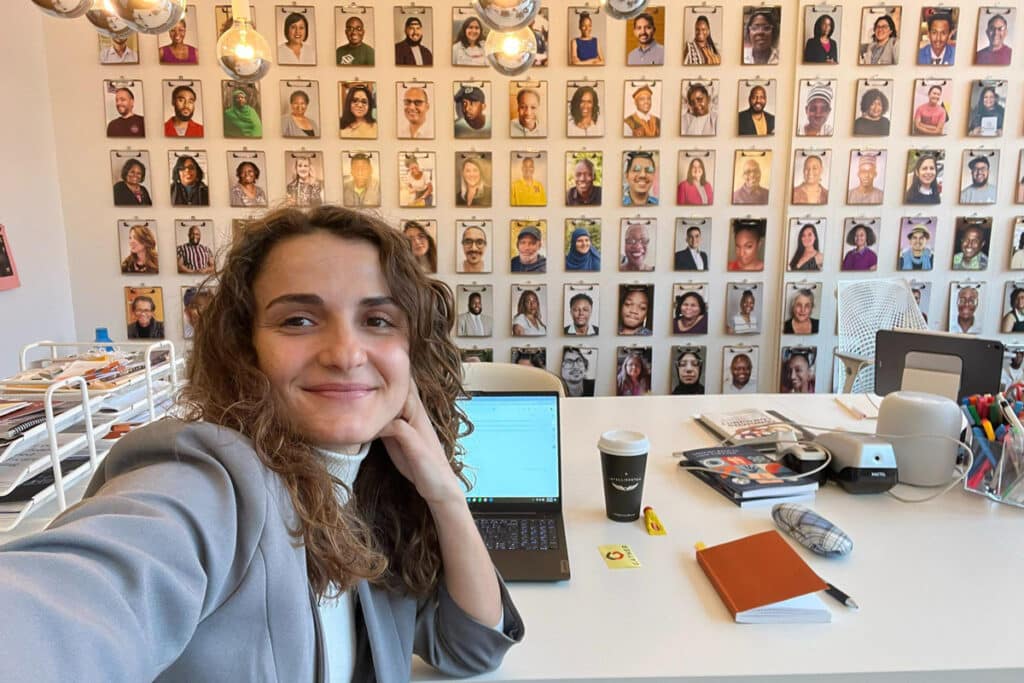
I had read about the Goldin Institute’s work and activities before joining them. However, only upon seeing the work firsthand did I gain a thorough understanding of the actual scope of its honest dedication and embodiment of equity and justice as the core values of community-driven social change.
From February to June 2023, I joined the team as a Communications Associate; I mainly worked on highlighting the Global Fellows’ and Chicago Peace Fellows’ success stories and assisted in various other daily tasks.
This was an inspiring journey, giving me a better insight into how the Institute’s Fellows programs impacted the Fellows and their communities. I interviewed a few incredible individuals from Chicago, South Africa, West Africa, Nepal, Philippines, and these are a few who inspire me:
Nicole “Coco” Davis, 2021 Chicago Peace Fellow and CEO/President of Talk2mefoundation: Coco took young Chicagoans on a trip to Camp Duncan to support kids whose parents and caregivers are incarcerated and need healing and peace. Thanks to the generous support of her peers in the Chicago Peace Fellows Mutual Aid Collaborative, she made it possible for these young people to socialize, learn, exercise, and dance together.
“They say money cannot buy you happiness, but the Goldin Institute brought 25 smiles for youths at Camp Duncan.”
– Coco Davis
Dieudonne Allo, Global Fellow and CEO of Global Leading Light Initiatives, and Fatima Momoti, Program Coordinator: Marking International Women’s Day, Dieudonne and Fatima shared more about their success with Ibali Lam. This program provides women entrepreneurs with digital tools and innovative approaches to storytelling to connect them with existing and new customers and investors.
“The GATHER program of Goldin Institute inspired the model of Ibali Lam. Women, especially in this part of the world, do not have access to technology, so we give them access; we provide internet data so they can access the online platform. Women get tablets, too.”
– Dieudonne Allo
Andy Alegre, 2021 Goldin Global Fellow from the Philippines: among others, shared a few tips on working with people from diverse backgrounds while respecting their differences to solve issues affecting the community. Andy also emphasized the importance of being a Global Fellow and how it has offered him global perspectives obtained from his peers during the weekly discussions. While discussing influential resources, Andy mentioned the GATHER platform.
“The GATHER platform tremendously contributed to my learning as a professional and community activist. The platform was easy to navigate and use and facilitated intuitive and practical learning by providing useful concepts and examples for community leaders like me.”
– Andy Alegre
Evolving into a Fellow
Hearing directly from Fellows made me appreciate the organization’s approach. Upon returning to Kosovo after my internship, I was encouraged to apply for the 2023 Goldin Global Fellows program. This saw me evolve from being an intern for four months to one of the 20 chosen Goldin Global Fellows. I became the first Fellow representing Kosovo.
Although I already had a general picture of the Fellowship and its immense impact on community activists, it was only while being part of it that I fully understood its importance in uniting and bringing activists together to hold timely and important conversations.
We shared our backgrounds, passions, and motivations and set the terms for global cooperation, such as that of two remarkable peers, Jill Langhus-Griffin from Arizona and Tarun Masapeta from India, who have created a financial literacy program for trafficking survivors in the U.S.
It was at this point that two notable things happened for me: 1) I gained a fresh perspective on my community assets, and 2) I became part of the Gather Care team.
A Fresh View of My Neighborhood: One of the Fellows’ first assignments was to walk through our neighborhood and identify the existing assets within our community assets, rather than focusing on what is lacking.
Unlike how I was used to seeing community deficiencies most of my life, this approach was entirely authentic and fresh and impacted my long-term thinking, too. After this, I walk through my neighborhood differently. I reflect on the asset map I created, highlighting more of what we have rather than giving power to what we lack.
This approach gives Fellows a life-learning lesson and perspective on helping their communities by finding innovative solutions that are authentic to each community. For instance, I listed traditions and coffee shops as existing assets in my asset map. They serve as places and platforms for gatherings, sharing, and a place for community activities. Without this newly gained perspective, I would not recognize the potential in these everyday things.
GATHER Care Platform: Co-facilitating GATHER Care: Caring for those who care for others online forum was an amazing, fulfilling, and tangible outcome from my time as a Fellow. With our peers and people from other cohorts who joined us, we met and discussed the importance of mental health for community activists and came up with solutions to improve the situation.
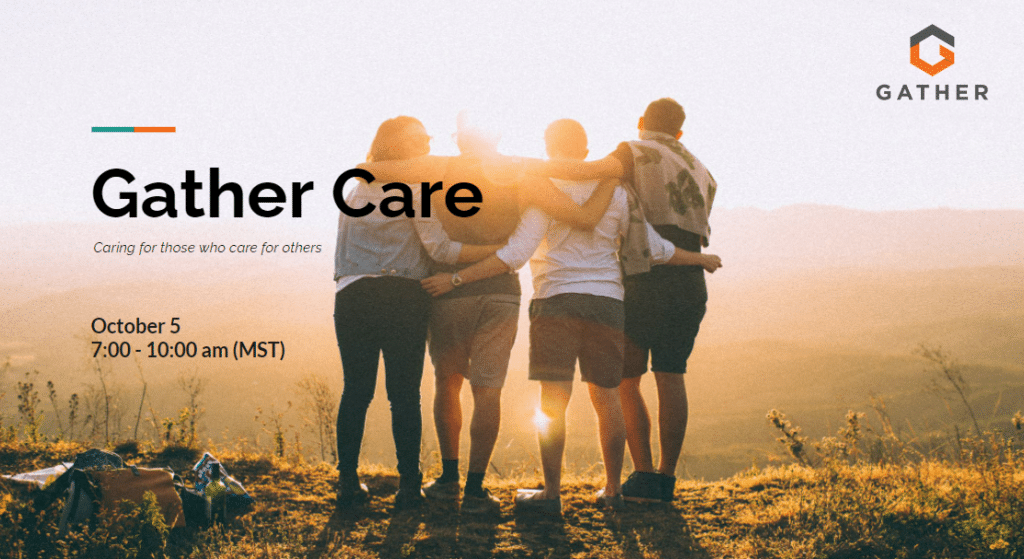
One of the key outputs of this summit was the creation of a Buddy System. Through this system, Fellows who were keen to support each other were assigned voluntarily and matched with another Fellow for additional support, learning, and connection to help alleviate the anxiety that they may be feeling, acknowledging their mental health and well-being as a priority.
We have seven pairs of buddies and are considering extending this system to the next cohort, as it could hugely benefit their well-being.
“It became apparent there was a need and desire within the group to create deeper connections and to support one another.”
– Jill Langhus-Griffin, Creator of Gather Care, 2023 Goldin Global Fellow.
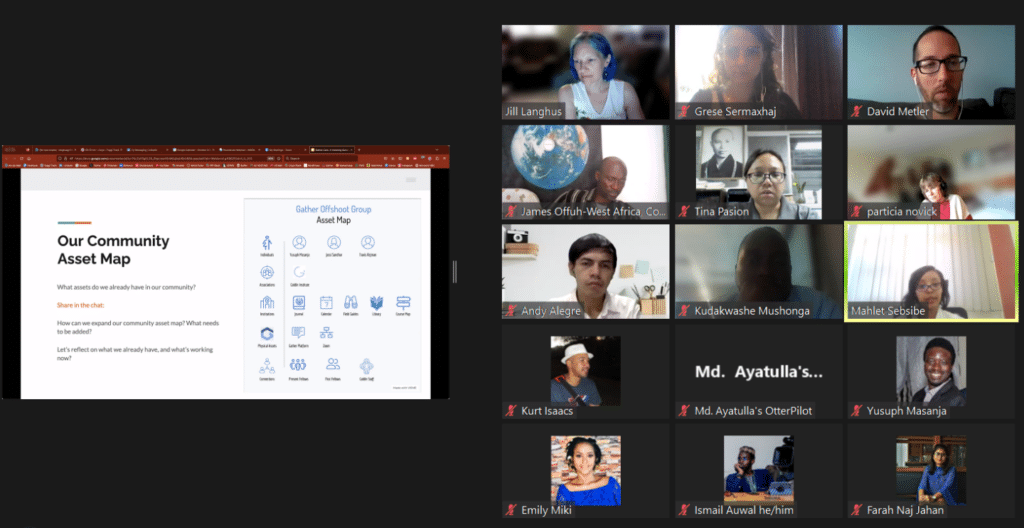
A Global Perspective: From Chicago to Prishtina, Looking Forward
Now, I am back in Prishtina and working for the Goldin Institute as a Media Coordinator. The global nature of the Goldin Institute’s work fits my current remote engagement, offering me a say and participation in community work that, to date, touches over 100 cities in over 40 countries to build meaningful partnerships rooted in the needs and assets of local communities.
Coming from and living in a small country in the Western Balkans, with its socioeconomic struggles, makes my engagement with the Goldin Institute of unique significance and potential. Since joining the team, I evolved my perspective on my role in my country’s history and its community-driven solutions. I have adopted a more proactive approach to participating in socioeconomic narratives, community discussions, and initiatives.
As each day goes by, my interest and engagement in my community continue to grow, thanks to the supportive environment provided by the Goldin Institute, including its dedicated team and inspiring Fellows. In the five months I have been back from Chicago, this fellowship has greatly complimented my work and goals.
For me, being part of the Goldin Institute is meaningful because it lets me connect with peers from around the world who have been through destruction and social upheaval. It has been mighty for me to learn what other Fellows and community activists are contributing to their communities, and I know that they will be there for me in the future, too- just as I will be there for them.
Today, on behalf of the Goldin Institute, I extend our wholehearted thanks to our supporters, Fellows, and partners for believing in and standing with us as we look forward to entering a new decade and expanding our impact and global network.
As the Goldin Institute will open its doors in Colombia and Tanzania, establishing two new offices in these countries, we remain committed and optimistic for a future that facilitates community-driven social change through and with grassroots activists.
Transforming a Barbershop into a Children's Library
One day recently, James Offuh, 2022 Goldin Global Fellow and Founder of United for Peace Against Conflicts International (UFPACI) from Côte d’Ivoire, saw kids playing with his barber tools. Realizing the hazards here, he instead offered them some books as an alternative which saw the creation of his Peace Library Project.
This seemingly random moment created a positive change for the kids in his community, highlighting how we can play our part in creating social change by leveraging the resources we already have. As a result, James, a peace advocate and educator, initiated the Children Transformative Literacy Peace Library Project and contributed to a visioning summit by launching a parenting toolkit in his community.
In this piece, he speaks more about this initiative’s impact on the children and their families, the challenges faced, and the driving inspiration behind this transformative work.
A Library Provides a Safe Space for Children
Before the creation of the peace library, which is entirely free to use, James states that children loitered on the streets, playing harmfully like throwing stones at each other, interacting with abuses like rudeness and arrogance, showing hateful sentiments, and being apathetic to one another.
“In contrast, now major outcomes are that children around my community have found a safe space for learning virtues, values that support good moral behaviors.” he says. Further, he believes – through such initiatives – children are more likely to be exposed to peace, justice, social cohesion, and accountability values “Most importantly children are developing interest in books, learning to read and always visiting the book station as a place of socialization.”
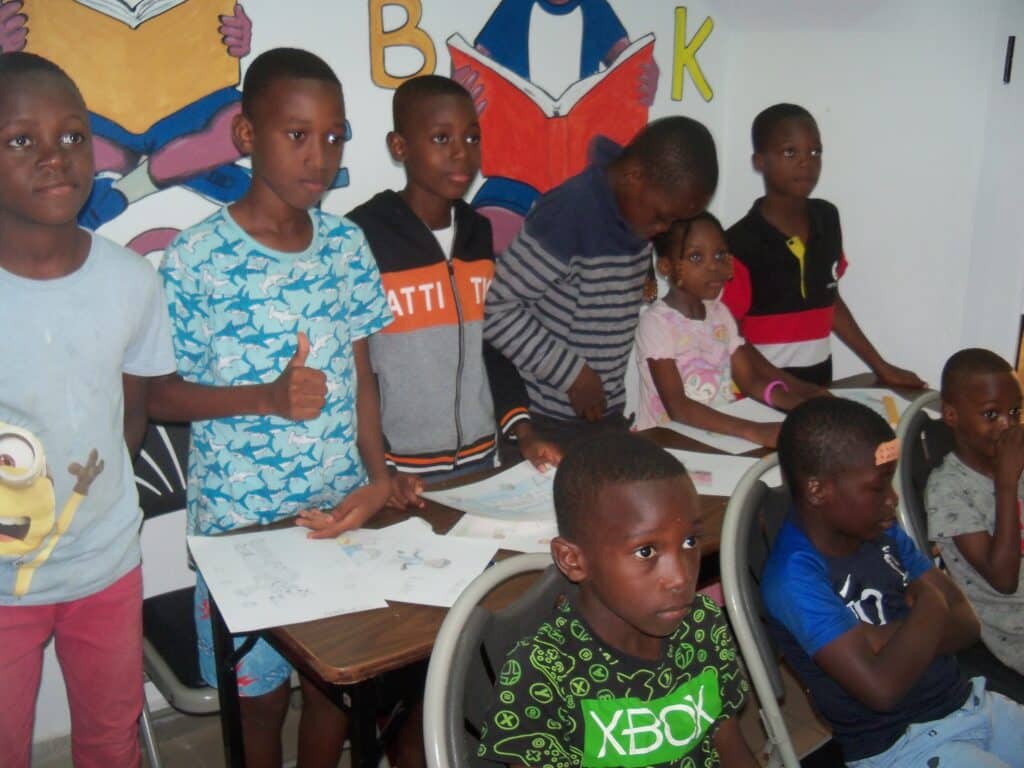
He highlights the role of the ‘Assets Based Community Development’ approach by valuing it as a critical principle to uncover gifts within our community, focusing on what’s “strong” rather than what’s “wrong”.
“When planning a community-driven social change mechanism and action frameworks, such as transforming my barbershop into a community peace library to address early child illiteracy and juvenile crimes, one should pay more attention to the gifts as opposed to deficits in society.”
— James Offuh
James remarks that many children do not have the necessary parenting guidance or resources, which often leads to children and teens getting involved in criminal activities, hard drug deals, and the consumption of marijuana.
This often meant they were sent into juvenile crimes that became alarming in the Abobo town in Abidjan City. James gives a perspective on how this alternative education space outweighs some traditional ways to solve this social problem.
“I discovered that these children, most of them grew up on the streets, had no good moral education background, applying punitive, coercive measures will not solve the problem holistically, as police keep making arrests, imprisonments, etc.“
— James Offuh
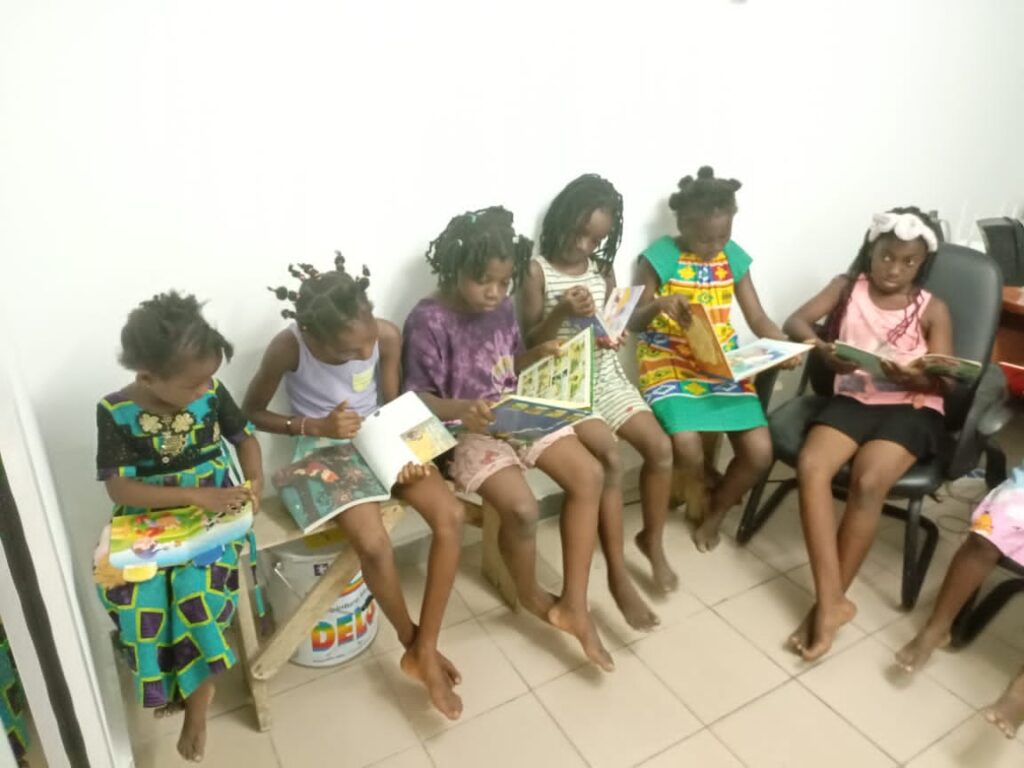
Transformational Peace through Asset Based Community Development
Further, James speaks on how, in his everyday work at the UFPACI, he implements the knowledge gained during his time as a Goldin Global Fellow: “Goldin Institute’s Gather program was an eye-opener to me; before the program, I did not know about the terms ‘ABCD’ approach and Community Driven Social Change action.” Moreover, he recalls how adaptive leadership versus technical leadership helped him understand more conflict sensitivity, analysis, and ‘do no harm’ as a tool for diagnosis over individualistic versus relational context.
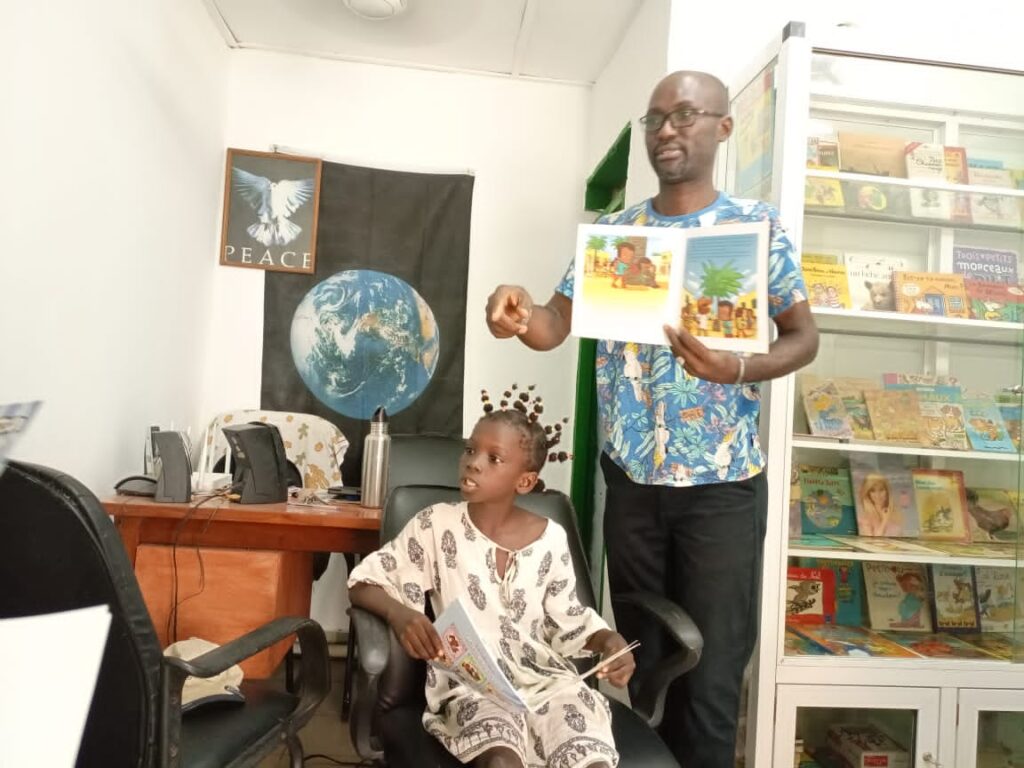
Goldin Institute expanded his global connections, too. “The Gather program expanded my networking, and I got a partner from the U.S.A. who visited me here in Cote d’Ivoire and got my details from the Goldin Institute website. He is also a member of the Gather Global Alumni network.” James also gained free online training workshops, participating recently in Project Management and Strategic Planning, which helped him learn how to design, plan, implement, monitor, and evaluate processes and outcomes.
Conclusively, James leaves us with a saying from Fredrick Douglas:
“It’s easier to build strong children than to repair broken adults.”
With his tireless work and activism at UFPACI, James and his team promote social dialogue, a non-violent culture, and peace reinforcement. Read more about their work and find ways to support them by checking their website: https://ufpacidialogue.net/. You will support the library’s longevity and sustainability so it can serve as many children for as long as possible.
Currently, the library needs infrastructural support like stable internet connectivity, electricity, comfortable reading seats and tables, workshop toolkits like drawing materials, and story books in English and French language.
Anika Talent Show: Empowering Kenya's Youth for Environmental Education
Visual artists, dancers, poets, thespians, and vocalists between the ages of 14 and 25 were brought together in a lively event in Kenya promoting green skills and environmental justice, aligning with the International Youth Day 2023 theme.
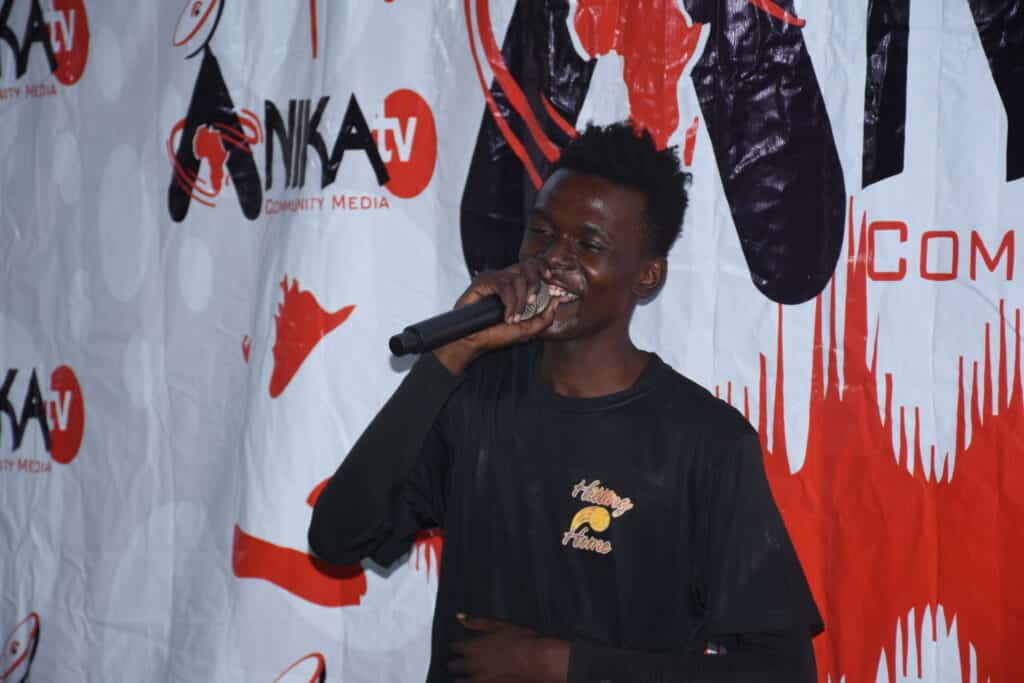
This event was made possible by Nicholas Songora, 2021 Goldin Global Fellow from Kenya and Founding Director Manyatta Youth Entertainment, and his dedicated team behind organizing the Anika Talent Show in celebrating International Youth Day in Partnership with the Forum civ Eastern and Southern Africa hub under the Wajibu Wetu; Jumuika Sikika Program with collaboration from the private sector, religious leaders, persons with disabilities leadership, national and county governments.
Nicholas speaks more to the Goldin Institute about this activity and why it represents a movement that harnesses the power of art to drive change.
He believes that people together can create a sustainable world where everyone, through artivism, contributes to a brighter future. Already, he is leaving his mark on infusing positive change and possibilities among young people.
Nurturing the Youth as Change Agents for Environmental Issues
This gathering equipped young people with green skills and a profound understanding of environmental justice while utilizing the transformative potential of arts to foster sustainability in society.
Nicholas delves into how they incorporated sustainability and environmental justice in this event.
“The activity involved performances like dance and music that narrated stories of environmental struggles, resilience, and hope. These performances fostered empathy, understanding, and a sense of responsibility toward the planet. This was a powerful medium to raise awareness about environmental challenges.” - Nicholas Songora
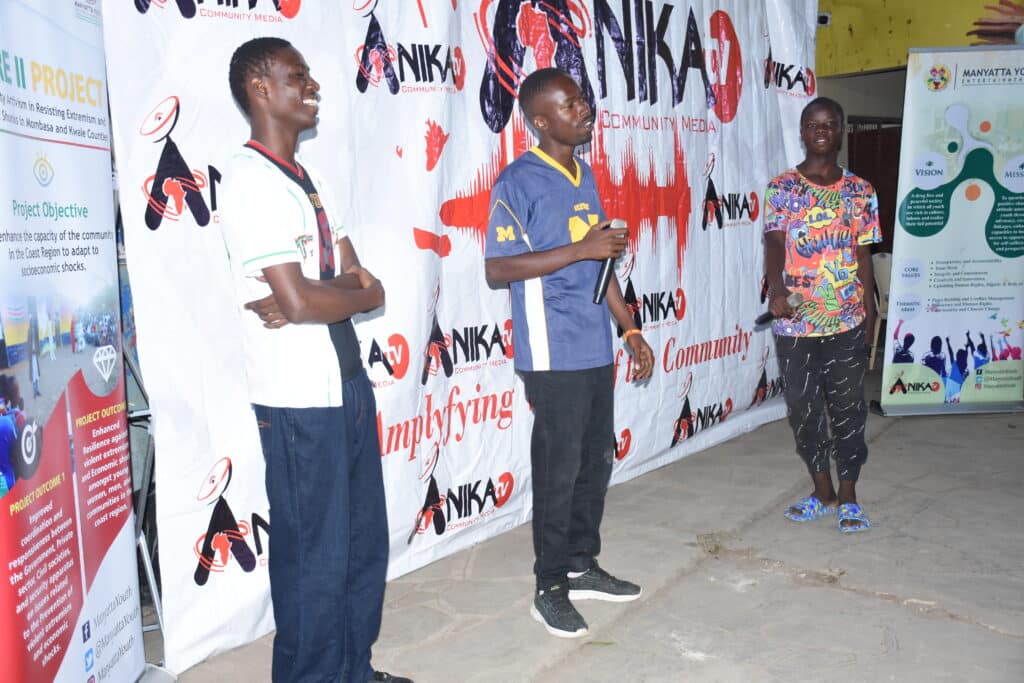
He highlights that photographers pledged to vividly portray environmental issues, ecological beauty, and the consequences of unsustainable practices through art exhibitions.
From the interactive discussion, participants, including village elders, engaged in addressing climate change challenges. They shared personal experiences and ideas for climate action, including sustainable agriculture, waste management, and energy conservation.
Strengthening Community Work through Networking
Further, he expresses his gratitude to several collaborative partners who contributed to the success of the Anika Talent Show.
“As an organization, we prioritize a multi-sectorial approach in programs and project management. According to our strategic focus, one of our critical mandates is to create linkages and alliances with other like-minded organizations and institutions.”
Therefore, Nicholas adds building partnerships and collaborations places the organization at the center of decision-making tables at the county, regional, and national levels.
“This has fostered community ownership and has enhanced sustainability. We collaborate closely with the national and county governments, the private sector, and religious institutions. Also, we collaborate with youth, women, and persons with disabilities networks while forming part of the civil society leadership in Kenya's Coastal region.”
He sees collaboration as fostering cost efficiency and effectiveness, sustainability, and long-term impact accepted by the masses.
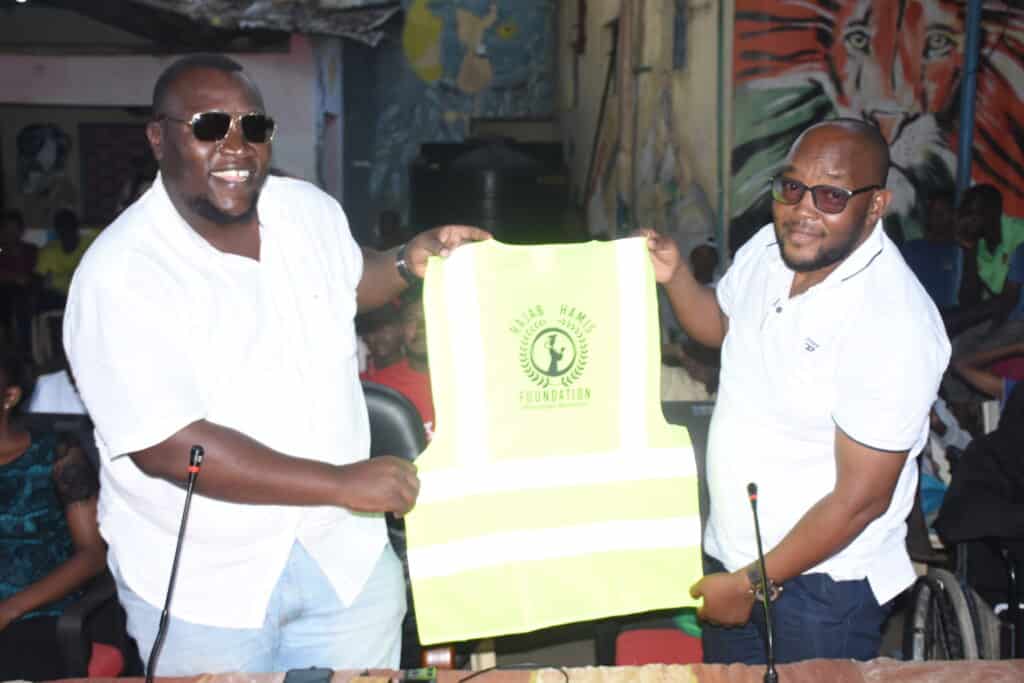
The Lasting Impact of the Goldin Institute Fellowship and Looking Forward
Nicholas acknowledges that he applied the key strategies learned from the Goldin Global Fellowship, from planning to executing the Anika Talent Show.
“Through design, we applied the concept of community asset mapping, which we learned during the Goldin Global Fellowship. In this step, we reflected on the available stakeholders at the grassroots and national levels.”
Further, he elaborates on how they divided into mapping the available resources and funding to support the initiative.
“Identifying potential collaborators was easy, including nominating young people to lead in the activity. Mapping of potential artists within the Anika Community Hub and inviting more from the community.”
Conclusively, drawing from his experience, Nicholas shares his advice with aspiring young people and how they can play a proactive role in their communities.
“The #YouthTribe is a powerful family with all it takes to change the existing narrative and achieve a green economy as a global identity.” he says.
“In most countries, youth form the largest percentage of the population; for example, in my country, Kenya, we are approximately 80% of the population but cannot make a difference if we keep working in isolation. We must unify our voices, be counted, and influence our way to the decision-making table through dialogue and collaboration.”
He draws our attention to the fact that youth cannot win by competing or fighting other stakeholders but by embracing the unity of purpose and fostering collaboration.
Nicholas calls youth to “rise and start building partnerships and networks with multi-stakeholders.”
Interfaith Advocacy to Promote Children's Safety in the Philippines
This July Andy Alegre, 2021 Goldin Global Fellow from the Philippines, engaged in the Regional G20 Interfaith Meeting in Manila (the capital city of the Philippines), moderating a session focused on the online sexual exploitation of children. In this piece, he speaks to Goldin Institute about his experience at the meeting and lessons learned. He also shares a few tips on communicating and working with people from diverse backgrounds while respecting differences to solve issues affecting the community.
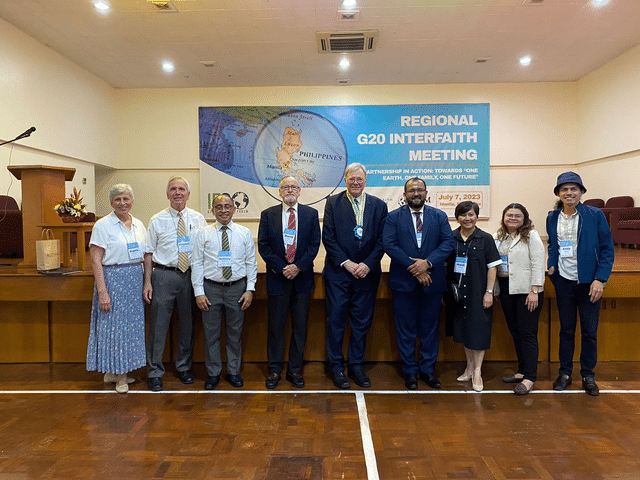
Andy, a people person, emphasizes how being a Global Fellow and offered him global perspectives from his peers during weekly roundtable discussions and connections and during monthly Alumni network roundtables.
He starts our conversation with the Regional G20 Interfaith Meeting in Metro Manila. The five issues highlighted in the meeting were: 1. the interacting demands of climate reform and humanitarian action, 2. emerging challenges of online sexual exploitation, 3. trafficking and modern forms of slavery, 4. children’s education concerning their rights, especially in conflict and abuse situations, 5. protection of freedom of religion and belief.
“It was an excellent opportunity for me to actively know, engage, share, and learn from faith leaders and experts from the government, non-government organizations, and communities on issues that affect most Filipinos.” -
Andy Alegre
The engagement and meeting were significant for Andy, his advocacy, and his community because, according to him, they amplified the issue to various leaders and promoted collaborative recommendations and action.
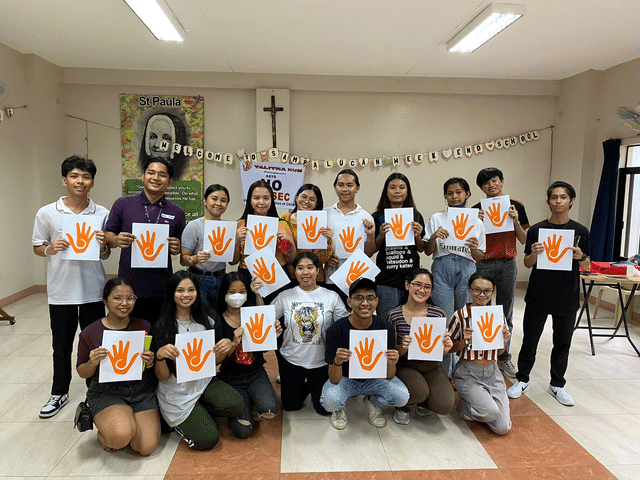
The Importance of Embracing Differences in Interfaith Settings
After the plenary session of experts sharing the five topics, almost 90 meeting participants were divided into five groups based on the thematic areas. Andy moderated one of the breakout sessions, focused on the online sexual exploitation of children, with 29 attendees which he states did not go without its challenges.
“The breakout session was designed to elicit recommendations from attending representatives from various government agencies, non-government organizations, faith-based communities, and networks. I started by calling in some discussion starters to share challenges, best practices, and initial recommendations on the issue.”
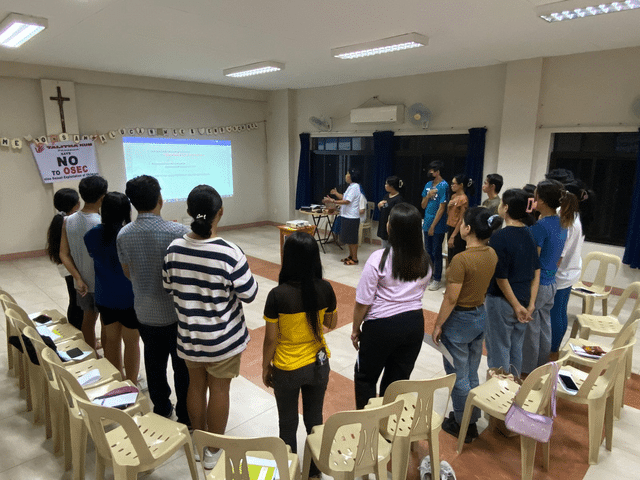
Andy recalls that one of the challenges moderating the session was balancing the time for all breakout attendees to elicit valuable input and stay on the course of the discussion quickly: “Some participants wanted to share much input, but the session had a limited period, and I had to gently remind them to wrap up so as not to take the time reserved for others.”
Another challenge, Andy adds, was summarizing the main points shared and ensuring that all recommendations were captured when wrapping up the discussion. Since he engaged with representatives from the government, church institutions, academia, and faith-based organizations, he also shared some advice on how to best work with people from different backgrounds. He reminds us of the importance of valuing anyone with a unique way of expressing, responding, and contributing to solving an issue that affects us.
“Embracing differences and respectful acceptance are approaches I use when working with people from various backgrounds. I also ensure to address them with the title that they want to be addressed. It is also helpful for me to engage these various representatives because of my experience serving in these institutions and knowing the system and culture.”
- Andy Alegre
Andy believes that being respectful and open are valuable traits that allowed him to be successful in his engagements.
Meeting with International Advocates in the GATHER Platform
Andy met grassroots leaders from around the world two years ago to learn and work together, as a Community of Practice, through the Goldin Global Fellows program, which he cherishes today. “My experience as a Goldin Fellow has been excellent as I learned valuable lessons, methods, tools, and approaches in my community development and engagement work.” he says.
While discussing influential resources, Andy mentions the GATHER platform:
“The GATHER platform tremendously contributed to my learning as a professional and community activist. The platform was easy to navigate and use and facilitated intuitive and practical learning by providing useful concepts and examples for community leaders like me."
- Andy Alegre
In addition to the content on the platform, what enriched Andy's learning was his fellow cohort members' meaningful and valuable reflections and contributions. “I also appreciate that the program is so inclusive – multi-generation, multi-faith - with fellows from all over the world with diverse backgrounds and identities” he says in a conclusive note.
Suggested Article:
Meet the 2023 Goldin Global Fellows English Language Cohort
Grassroots Peace Building in Nepal
Santoshi Wagle, a 2022 Goldin Global Fellow and non-violent communication (NVC) trainer for NVC Practise Group in Nepal, shares her experience and reflections leading an event for International Peace Day 2022 in her own country, Nepal. Santoshi unpacks her challenges, the lessons she learned, and the profound impact she is making by using the skills she gained through her Goldin Fellowship and the GATHER platform.
During International Peace Day, students, youths, and community groups came together to celebrate: “The participants explored the existing conflicts and causes of violence, the role of peacebuilder, qualities of peacebuilder peace-building process, emotional awareness, emotional regulation, and conflict transformation,” Santoshi explains. Coming together was necessary for the community to address common issues and find practical solutions and action plans for sustainable peace and social change. "With the growing conflict among humans at internal and external levels, the event turned out to be a self-reflective program.” she adds.
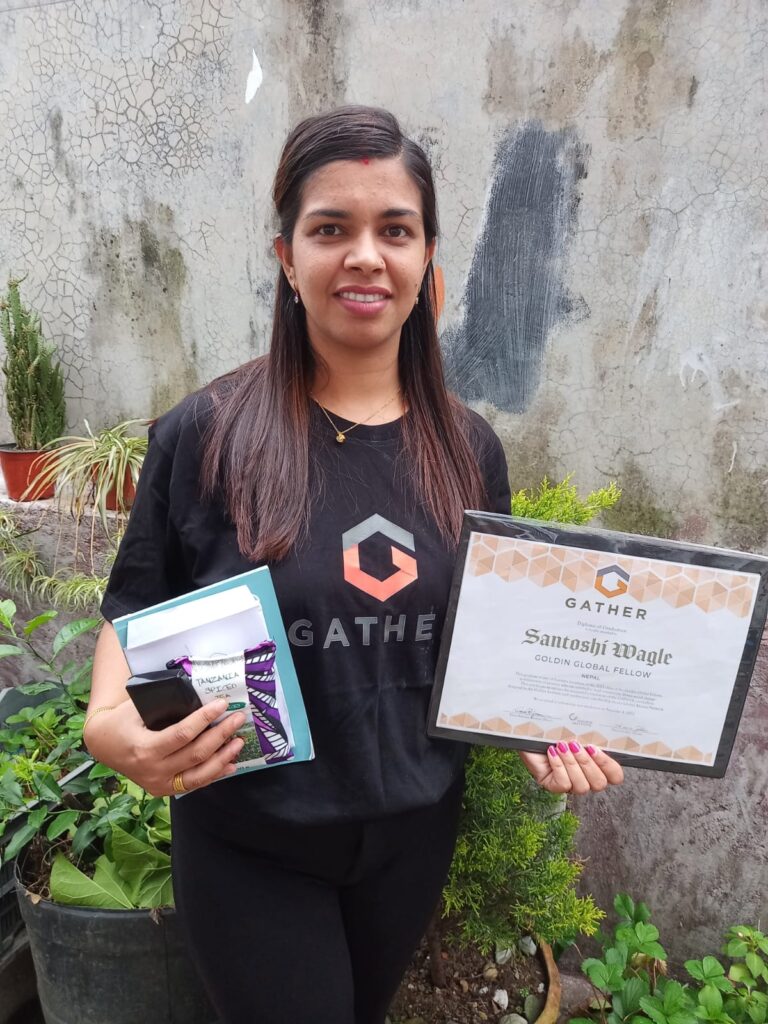
Training Women and Children on Peace Building
These community initiatives come with challenges and hardships too. Santoshi particularly emphasized the challenge of bringing a group of women together in Nepal: "Despite their interests and will, it was challenging for women to find the time for this activity because of their responsibility to care for their children and daily work.” Nevertheless, in collaboration and coordination with her local partners, namely NVC Practice Group Nepal, Radha Krishna Aama Samuha (women group), and Srijana Secondary School, a coalition was able to cover travel expenses and create some allowances for women participants: “We also managed a caregiver to care for children during the event, so we could include the mothers having small children.”
In hindsight, she also reflects on the importance of the event's timing and the arrangements of essential expenses for participants and programming. For this, Santoshi emphasizes the pivotal role of safe circles: "Those safe circles are where we can discuss and empower the groups to discuss widely in the community event, so every voice can be expressed and fully heard.” Safe circles allowed for both personal and programmatic need to be addressed by the community as a whole, rather than becoming the burden of one person.
She also acknowledges how this one-time event turned out very challenging to balance the power and openness among the participants: “Regular meetings and follow-up events are important for sustainability, awareness, and empowerment for promoting peace and social justice.”
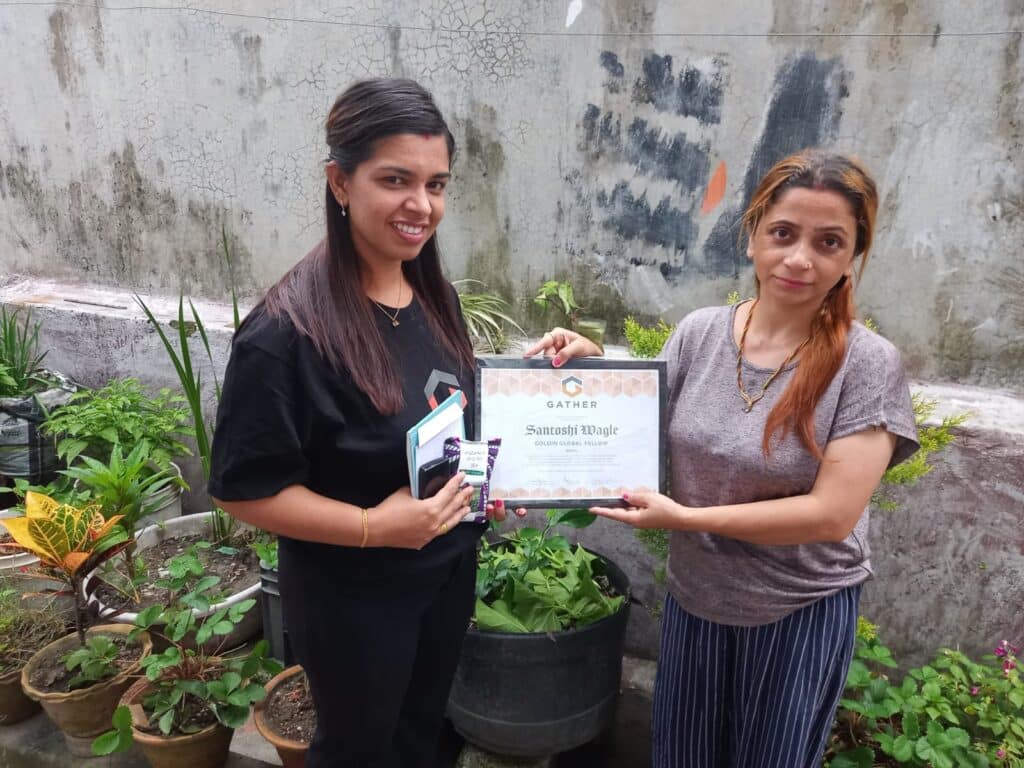
Connecting Nepal with an International Community
Santoshi connects the successful completion of this event with the skills she learned during the GATHER course while being a Goldin Global Fellow: “The creative insights that I learned during the course, in identifying community assets, community visioning summit, the idea of technical challenges and adaptive challenges, the importance of bringing the community together into the discussion for the collective issues and developing shared agreement and follow up were constructive in successful implementation and create wider impact in the community." “Gratitude to the Goldin family for the profound wisdom that I received during and after the fellowship”, she adds.
She and her team organize regular meetings, community events, and international day celebrations to strengthen grassroots communities and promote sustainable social change. This year, she is conducting workshops on nonviolent communication for teachers and women groups, continuing with women groups conducting safe listening circles and awareness programs against the dowry system and caste discrimination as a follow-up to last year's activities: “I invite the wider community to join this program and synergize to create a wider impact. Let's join hands to have peace and harmony in this land.”
Conclusively, she invites volunteers to join the programs in schools and communities, organized with her partner organizations The School of Nonviolence and Srijana Secondary Schools: “We offer an opportunity to learn, share and play with the wider community.”
Meet the 2023 Goldin Global Fellows English Language Cohort
MEET THE 2023 GOLDIN GLOBAL FELLOWS ENGLISH LANGUAGE COHORT
The Goldin Institute is proud to introduce the 2023 Goldin Global Fellows
We invite you to learn about each of the outstanding Goldin Global Fellows who live and work in Albania, Bangladesh, Burundi, Cameroon, Ethiopia, India, Kosovo, Malawi, Mali, Nepal, Nigeria, the Philippines, Senegal, South Africa, Sri Lanka, Tanzania, the United States and Zimbabwe. This diverse group of fellows will learn and work together as a Community of Practice, building on the talents of their neighbors and the assets of their communities to make real and lasting change around the world.
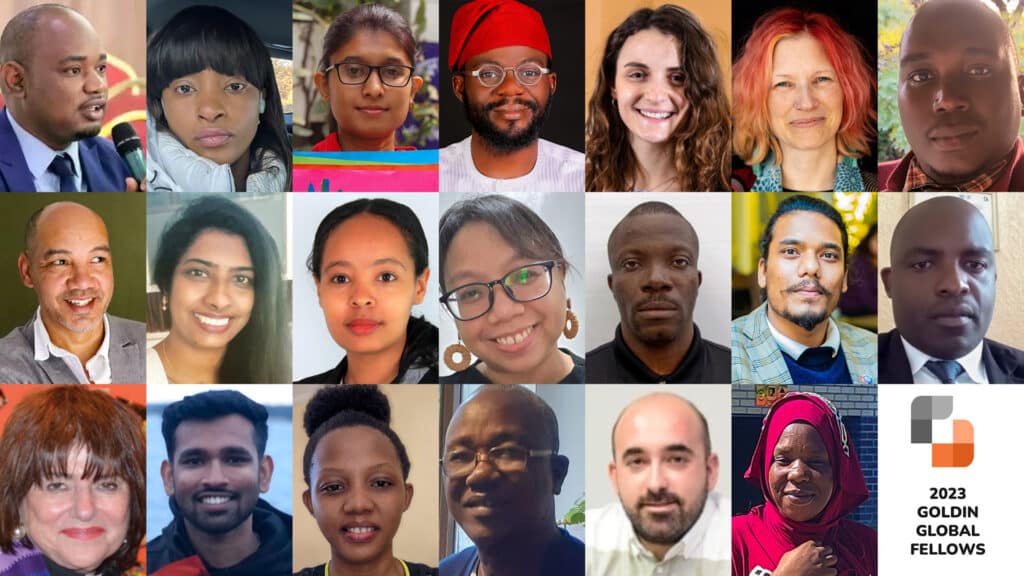
ABOUT GATHER
The Fellows are learning together through GATHER, which is both a mobile platform for shared learning and a curriculum for people who want to build on the talents of their neighbors and the assets of their communities to make real and lasting change. Gather Fellows learn and work together through an innovative curriculum that comes pre-loaded on a tablet device with all the connectivity, materials, videos, practices and tools necessary to provide a mobile classroom and toolkit for community leadership.
The Goldin Global Fellows connects and equips grassroots leaders across the world to lead community driven social change. The 2023 Goldin Global Fellows is the fifth international cohort to utilize the GATHER platform, an online learning hub built by the Goldin Institute to empower grassroots leaders. They will engage in a 22-week course of intensive shared learning as well as group projects, culminating in a graduation event in Fall 2023. The curriculum has been designed and refined in collaboration with the Fellows themselves, based on their practical knowledge and hard earned wisdom, with input from a wide range of civic leaders.
To follow along the learning journey with the Goldin Global Fellows, please sign up for our newsletter and follow up on Twitter, Facebook and Instagram.
